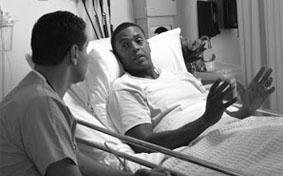For the past eight months, I’ve had cause to visit several medical offices (will explain in another column) in Easton, Annapolis and Baltimore, spending time with numerous doctors, nurses and office staff.
I’ve become keenly attuned to “bedside manner,” both good and bad. I suspect this term is well-understood. For those of us caught in the throes of the medical system, I’m referring to the communication skills, or lack thereof of medical professionals. Also, ability to communicate includes personal warmth and empathy—or (here I go again) lack thereof.
In recent months, a local doctor, a likable, personable and capable person, said to me, “You know, they didn’t teach bedside manner in medical school.”
He added, “I think it’s important as a doctor to treat someone in the same way I would want my father or mother treated.”
Think about these comments, as I have. It’s almost inconceivable—except it isn’t—that medical schools apparently pay little or no attention to the emotional treatment of patients. I’ve always understood that physical recovery is tied directly to emotional well-being.
Regarding medical school instruction on bedside manner, I have two thoughts. First, why is it necessary to teach what common sense demands? I’m bewildered. If folks dealing with a medical problem, alleviated by just plain, down-home human communication and feeling, can improve their outlook and prognosis for recovery, then it is reasonable to expect a mixture of science and sensitivity to confront a medical ailment and achieve a successful outcome.
Second, if medical school administrators have access to credible studies linking clinical treatment and sincere empathy, then why would there be any hesitation to include “bedside manner” as a compulsory subject? Does it seem too wishy-washy, too unscientific?
Now, before readers think I’m whining about poor medical treatment and communication, I am not. I’ve been mostly fortunate. The medical industry must satisfy Herculean pleas for help in a short time frame. Each of us considers our pain or discomfort to be greater than anyone else’s. We want immediate, full-throated attention.
While I admire a professional clinical approach, I also value people skills, to include sincere listening and even a sense of humor. I’m aware that many people are content with superior clinical skills; a doctor’s personality is irrelevant.
Having successful surgery or procedure outweigh the need for a personable surgeon. All that matters is dealing with, or overcoming a medical crisis. This reasoning makes complete sense. A physician’s charm is just an extra, superfluous ingredient.
But I’m not convinced. Trust requires a dollop of humanity. Even a sprinkle of extroversion. To the point made by a local physician, I suggest that treatment should be geared to imagining that a patient is your father or mother.
My preference, however unrealistic at times, is skill coupled with an approachable, if not pleasing demeanor. Questions need to be asked. Human nature calls for answers. Straightforward, patient responses enhance recovery and promote a positive attitude. Anxiety diminishes.
I think I’ve kicked this horse enough. It’s time to conclude this column.
Columnist Howard Freedlander retired in 2011 as Deputy State Treasurer of the State of Maryland. Previously, he was the executive officer of the Maryland National Guard. He also served as community editor for Chesapeake Publishing, lastly at the Queen Anne’s Record-Observer. In retirement, Howard serves on the boards of several non-profits on the Eastern Shore, Annapolis and Philadelphia.



Write a Letter to the Editor on this Article
We encourage readers to offer their point of view on this article by submitting the following form. Editing is sometimes necessary and is done at the discretion of the editorial staff.